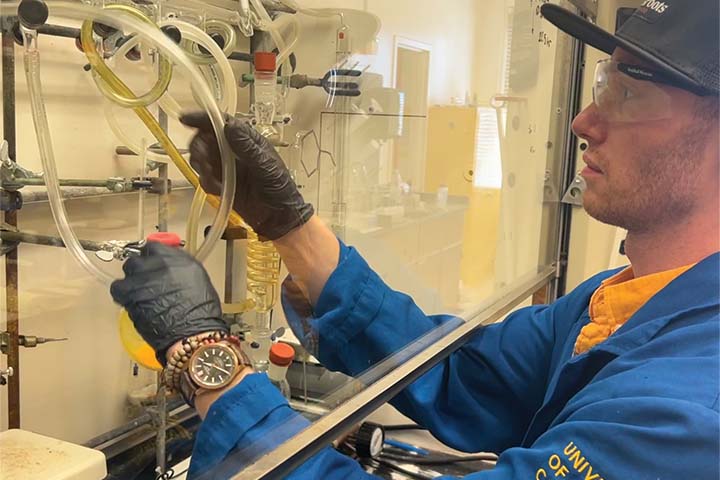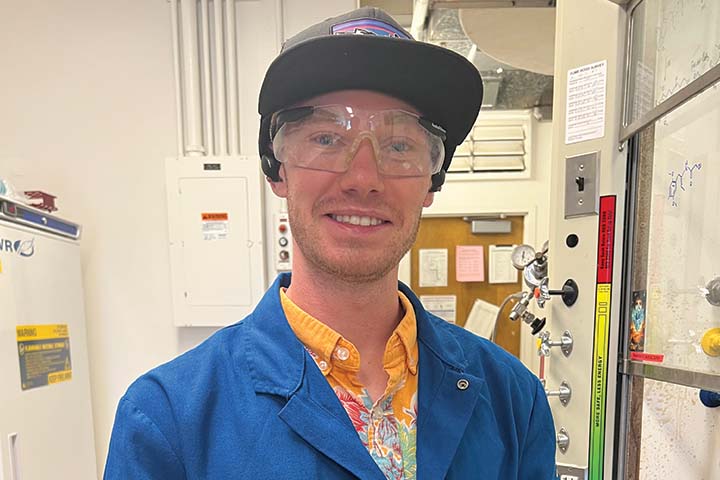Trey Brasher's Trip to High-Level Success
By Mark Melhorn

By Mark Melhorn

T rey Brasher ’20 hopes by studying some of the small structures of chemical compounds he’ll eventually have a big impact on finding a new treatment for Parkinson’s disease.
And the Liberal Studies graduate says his time at Stockton had a major role in putting him on the path to reaching that goal.
“I think LIBA (Liberal Studies) is the greatest thing going, honestly,” said the 29-year-old, Denver native who minored in behavioral neuroscience and holistic health. “The fact that LIBA existed allowed me to pursue a wider range of classes related to what I wanted to do than any pre-Med degree because there are all kinds of prerequisites that I would never use again (in pre-Med).”
The Liberal Studies major is an option for students whose educational or career goals or academic interests aren’t met by any of Stockton’s existing 160 areas of study.
And that was perfect for Brasher, who loved the natural setting of the Galloway campus within the Pinelands but wanted to major in pharmacology — a degree that few universities offer at the undergraduate level.

“I also wanted to get a more holistic overview of pharmacology than what is typical in a STEM degree,” said Brasher, who’s now studying for his Ph.D. at the University of California, Davis. “I wanted some of the cultural elements of drug history and current cultural practices surrounding drug use, and to bring in some of the neuroscience that you probably wouldn’t get in a typical pharmacology degree.”
LIBA Coordinator Richard Trama said Brasher is a prime example of what a student can do with the program.
“Trey arrived at Stockton with an idea of what he wanted his undergraduate experience to encompass. He was directed to me and after some invigorating and captivating discussions, we devised a curriculum that addressed his vision,” Trama said. “Then, after writing and editing/revising a compelling proposal, he began his LIBA journey. I have no doubt he will surprise himself and thrive beyond even his expectations because of the LIBA/Self-Design option.”
Brasher also loved the flexibility the LIBA degree offered for conducting undergraduate research. He took part in four independent studies while at Stockton and was part of two studies of published research and another that has been submitted for publication.
One study with Psychology Professor Marcello Spinella showed positive correlations between a lifetime use of psychedelics, like psilocybin, and a broad range of positive psychological traits. Another published case study written with Psychology Professor Jennifer Lyke looked at an individual who successfully used repeated doses of LSD coupled with nature therapy as a treatment for major depressive disorder.
Stockton may not be known as a ‘research’ university, but I think it absolutely is, and I think it could grow in that aspect in the future.”
Brasher added that a third manuscript he worked on while at Stockton has just been submitted for publication. It showed correlations between lifetime psychedelic use and gambling, sexual and food-based addictions. Psychedelic users showed lower levels of those addictions when compared to those who didn’t use them.
“(The research) was pretty high level for undergraduate classes. It allowed me to dive into some pretty complicated literature,” he said. “I knew exactly what I wanted to do. If you are interested in something you should try to learn more about it, and the LIBA allows you to do that.”
Brasher’s work studying psychedelics and psilocybin eventually led him to Davis, California, for his Ph.D. program at what’s “probably the No. 1 school in the world for psychedelic chemistry.” He has been studying the drug Ariadne, which was first synthesized in the 1970s, but largely forgotten about. Recent research has found that the non-hallucinogenic psychedelic could help treat depression and other mental disorders and could also have benefits in neurodegenerative disorders like Parkinson’s.
Brasher’s research is focusing on honing Ariadne’s pharmacology to make new compounds that could eventually be used to treat Parkinson’s.
“I want to make a molecule that’s never been made,” he said. “The goal is to get a more potent anti-Parkinson’s agent. The other goal is to deduce why Ariadne has anti-Parkinson’s effects and why none of the other drugs related to it do.”
One of the main threads through all his research is the idea that psychedelics, like psilocybin and Ariadne, should be more accepted by society and more research should be done so that these drugs can be used for legitimate purposes. While he was a Stockton student, he and a friend started a Students for Sensible Drug Policy chapter on campus.
“I have to say, I really do miss Lake Fred,” Brasher said. “There’s a meditation spot, kind of like a peninsula that’s a sandy secluded area that sticks out. I would go there and meditate frequently. It was quite beautiful. Stockton has a beautiful campus.”

And while he doesn’t have any immediate plans to come back, he said that he would love to give a lecture some day on his research.
“I’m very grateful for Stockton. I had an amazing experience there,” Brasher said. “The main thing is that the professors I met there really changed my life. They are people I still know, talk to and have worked with for years on really fruitful research that’s made a huge impact on my career.
“Stockton may not be known as a ‘research’ university, but I think it absolutely is, and I think it could grow in that aspect in the future.”
Learn more about Undergraduate Research opportunities at Stockton